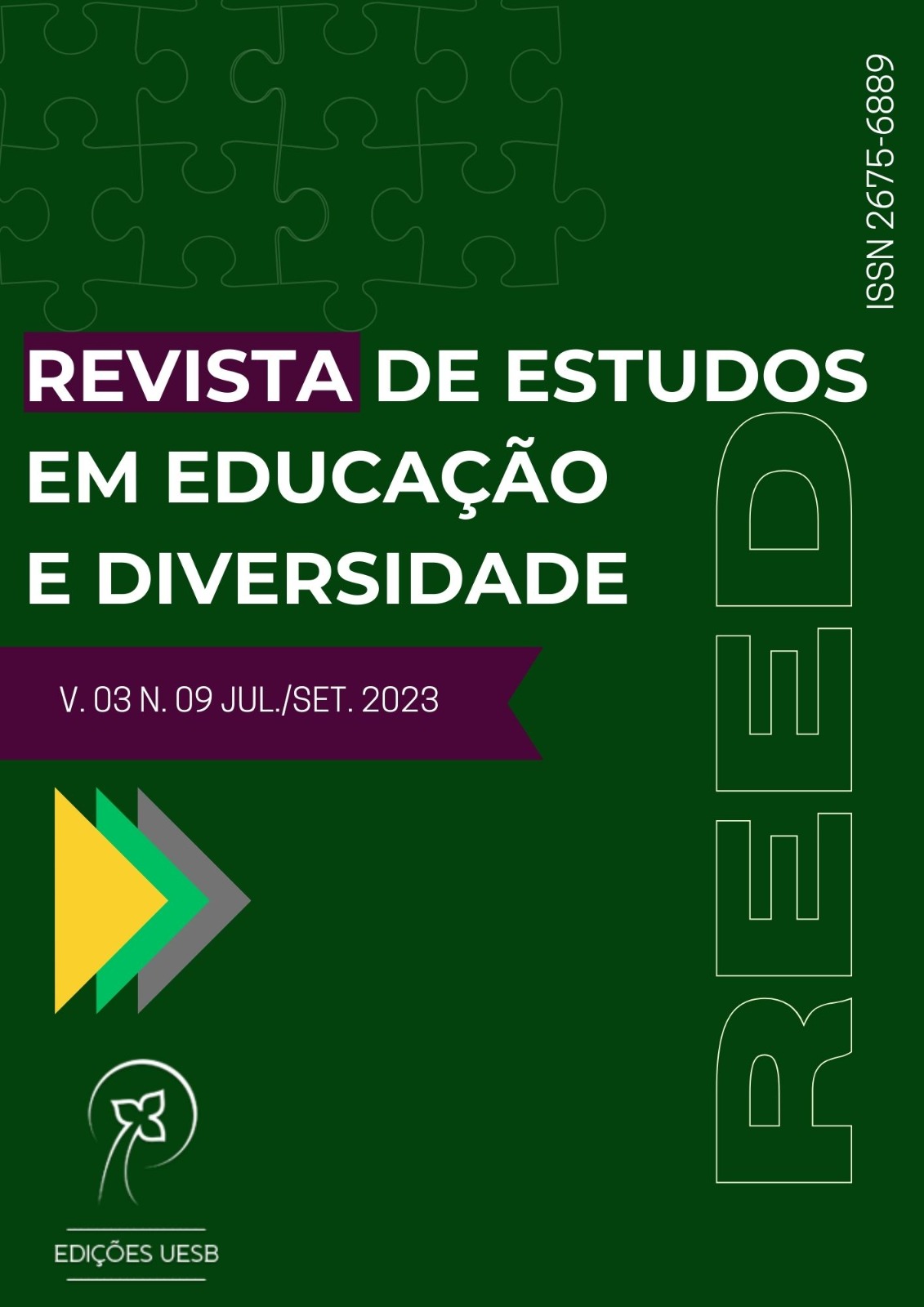Democratization of public education: gender and inclusion in education
DOI:
https://doi.org/10.22481/reed.v5i12.12936Keywords:
Public education. Democratization of education. Inclusion. Gender.Abstract
This article presents an approach to democratization in public education from the discussions about gender and inclusion in education. In which we aim to reflect the democratization of public school as a guide of discussions of gender and educational inclusion. Thus, this work it isa literature search, where we present historical elements involving the trajectory of the concept of gender, inclusion and the process of democratization of education in Brazil. We also bring about social changes perspectives and challenges that cover the public school in aspects of democratic management and gender inclusion. The theoretical framework used is guided in authors such as Candau (2020), Hooks (2019), Louro (2002; 2004: 2014), and other authors in the field of education that allow us to understand the democratic management and the inclusion of gender in the school environment, reflecting the school as a space for the construction of inclusion and diversity. Based on the discussion of gender and educational inclusion, we realize that the democratization of public education in the bias of inclusion follows a path in which the steps are slow, but much has been done, joint efforts to overcome the challenges that arise in the development of human relations present inside and outside the school.
Downloads
References
AUAD, Daniela. Educar meninas e meninos: relações de gênero na escola. São Paulo: Contexto, 2006.
BRASIL. Constituição da República Federativa do Brasil de 1988. Brasília, DF: Presidente da República, 2016.
BRASIL. Lei de Diretrizes e Bases da Educação Nacional nº 9.394, de 20 de dezembro de 1996. Brasília: MEC, 1996.
BAPTISTA, C. R. Integração e autismo: Análise de um percurso integrado. In: BAPTISTA, C. R, BOSA, C. A (Eds.). Autismo e educação: reflexões e propostas de intervenção. Porto Alegre: Artmed, 2002. p.127-139.
CANDAU, V. M. Didática novamente em questão: fazeres-saberes pedagógicos em diálogos, insurgências e políticas. In: CANDAU, V. M.; CRUZ, G. B. da; FERNANDES, C. (orgs.). Didática e fazeres pedagógicos: diálogos, insurgências e políticas. Petrópolis, RJ: Vozes, 2020. p. 33-45.
FOUCAULT, M. História da sexualidade I: a vontade de saber. Rio de Janeiro: Graal, 1994.
CORTESÃO, L. O arco-íris na sala de aula? Processos de organização de turmas: reflexões críticas. Lisboa: Instituto de Inovação Educacional, 1998.
GATTI, B. A. Formação de professores: perspectivas. In: SPAZZIANI, M. de L. (org.). Profissão do Professor: cenário, tensões e perspectivas. 1 ed. São Paulo: Editora Unesco, 2016. p. 117-133.
GIL, A. C. Métodos e Técnicas de Pesquisa Social. 6 ed. São Paulo: Editora Atlas, 2009.
HOOKS, B. Educação democrática. In: CASSIO, F. (org.). Educação contra a barbárie: por escolas democráticas e pela liberdade de ensinar. 1 ed. São Paulo: Boitempo, 2019. p. 199-208.
LOURO, G. L. Gênero, sexualidade e educação: uma perspectiva pós-estruturalista. 16. ed. Petrópolis, RJ: Vozes, 2014.
LOURO, G. L. Gênero: questões para a educação. In: BRUSCHINI, C.; UNBEHAUM, S. G. (orgs.). Gênero, Democracia e Sociedade Brasileira. 34 ed. São Paulo: Fundação Carlos Chagas, 2002.
LOURO, G. L. Os estudos feministas, os estudos gays e lésbicos e a teoria queer como políticas de conhecimento. In: LOPES, D. et al. (org.). Imagem e diversidade sexual: estudos de homocultura. Brasília: Nojosa, 2004. p. 23-28.
MARQUES, J. D. Um olhar sobre o currículo inclusivo para além dos aspectos burocráticos. Revista Educação Pública, v. 20, n. 21, jun., 2020. Disponível em: https://educacaopublica.cecierj.edu.br/artigos/20/21/um-olhar-sobre-o-curriculo-inclusivo-para-alem-dos-aspectos-burocraticos. Acesso em: 20 jun. 2023.
NASCIMENTO, L. F. do; CAVALCANTE, M. M. D. Gestão Democrática na Educação Infantil. RPGE–Revista on line de Política e Gestão Educacional, v. 21, n.1, p.190-214, 2017.
OLIVEIRA, D. A. A profissão docente entre a perda de poder e a afirmação da autoridade o recurso à formação. In: SPAZZIANI, M. de L. Profissão professor: cenários, tensões e perspectivas. 1 ed. São Paulo: Editora Unesp, 2016. p. 71-92.
OMOTE, S.; OLIVEIRA, A. A. S.; BALEOTTI, L.R.; MARTINS, S.E.S.O. Mudança de atitudes sociais em relação à inclusão. Paidéia. Cadernos de Psicologia e Educação. Ribeirão Preto, v. 15, dez., p. 387-398, 2005. Disponível em: https://www.scielo.br/j/paideia/a/5Q5chbRfYq7pBsJ6cQGmBCj/?format=pdf&lang=pt. Acesso em: 15 jun. 2023.
PINTO, Á. V. Sete lições sobre educação de adultos. São Paulo: Cortez, 1984.
SPAZZIANI, M. de L. Profissão de professor: cenários, tensões e perspectivas.1 ed. São Paulo: Editora Unesp, 2016.
VIEIRA, F. J.; WILL, E. M. A.; LIMA, L. C. de. Gestão democrática e participativa: horizontes e possibilidades de construir uma escola de todos e para todos. Revista Didática Sistêmica, v. 21, n. 2, p. 83-94, 2019.
Downloads
Published
How to Cite
Issue
Section
License
Copyright (c) 2024 Revista de Estudos em Educação e Diversidade - REED

This work is licensed under a Creative Commons Attribution 4.0 International License.
You are free to:
Share - copy and redistribute the material in any medium or format; Adapt - remix, transform, and build from the material for any purpose, even commercially. This license is acceptable for Free Cultural Works. The licensor cannot revoke these freedoms as long as you follow the terms of the license.
Under the following terms:
Attribution - You must appropriately give credit, provide a link to the license, and indicate if any changes have been made. You may do so in any reasonable way, but not in a way that suggests that you or your use is endorsed by the licensor.
There are no additional restrictions - You cannot apply legal terms or technological measures that legally restrict others to make any use permitted by the license.






